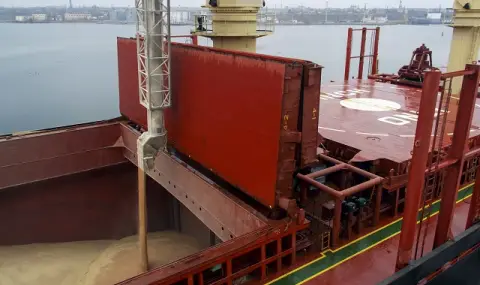In Odessa, the air alert signal sounds always. The city is under fierce Russian fire - especially the ports. Tons of wheat, corn, sunflower are exported from there. Without them, the prices of many foods would skyrocket.
In the large bay of Odessa there are three ports where cargo ships follow precise traffic rules. The Ukrainian military inspects every cargo arriving or leaving the port, and ships move along precisely defined safe corridors that are checked for sea mines, ARD wrote in a report from Odessa.
Furious Russian shelling
Russia withdrew from the grain agreement in July 2023, and more than 1,700 ships have passed through the corridor since then. About 50 million tons of cargo were processed, including mainly wheat, corn and barley, but also coal and metallurgical products, Dmytro Barinov, deputy head of the port administration in Odessa, told ARD. “After withdrawing from the grain export agreement brokered by the UN and Turkey, Russia is shelling the ports about 40 times more intensively,” he added.
About 200,000 tons of grain were destroyed in the attacks. According to estimates by the United Nations World Food Program, this amount would be enough to feed half a million people for a year. There were also victims – Russian rockets or dons at sea and Danube ports have so far killed 25 people, including a pilot, grain truck drivers and port workers. In addition, 200 warehouses, offices and other buildings were hit.
Nevertheless, in April 2024, about six million tons of wheat were exported - almost the same amount that Ukraine exported in one month and before the start of Russian aggression, writes ARD, citing the Ukrainian Ministry of Agriculture.
High prices, low income for farmers
Further on, the report takes us about 30 kilometers northwest of Odessa, where Valery Kotenko grows sunflowers. The 52-year-old producer sells his products through an intermediary.
For ARD, he says that he now earns $500 from a ton of sunflowers, while before the Russian invasion he sold the same amount for $800. “Fertilizers became more expensive and wages increased. Everything has become more expensive and someone has to pay for it, Kotenko points out.
Dmytro Barinov of the Odessa Port Authority is pleased that farmers can sell and export again. If Ukraine stops exporting agricultural products again, this will immediately be felt on the world markets through increased prices. A liter of sunflower oil used to cost one euro, but now the price is two or three euros per liter, the report says.
"We were very worried, but thanks to the Ukrainian military, the export corridors are working again,”, Barinov told ARD.
Ports and cities need better air defenses
In Odessa, air raid sirens often sound and everyone checks their mobile phones to see what Russia has fired and from which direction the threat is coming. “This time it is ballistic missiles", says a young boy.
Even a city like Odessa does not have enough air defenses to protect people, residential buildings and important port facilities, Barinov says.
"Our daily life looks like this: we spend the night in hiding, in the morning we have a quick coffee and then – on work. Then comes the next air raid signal and back to the shelters... We need a protective umbrella over the city. Then everyone in Odessa would feel calmer”, says Barinov.
